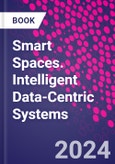Smart Spaces covers the latest concepts and technologies surrounding smart spaces, providing technical personnel engaged in smart space related research and industries a more in-depth understanding of smart spaces. This book can be used as a reference for practicing this emerging discipline, but it will also be useful for researchers, scientists, developers, practitioners, and graduate students working in the fields of smart spaces and artificial intelligence. It combines the study of working or living spaces with computing, information equipment, and multimodal sensing devices, and with natural and convenient interactive interfaces to support how people can easily obtain services from computer systems.
People's work and life in smart spaces use computer systems; it is a process of uninterrupted interaction between people and the computer system. In this process, the computer is no longer just an information processing tool that passively executes explicit human operation commands but a collaborator with people to complete tasks - a partner to human beings. International research on smart spaces is quite extensive, which shows the important role of smart spaces in ubiquitous computing research.
Please Note: This is an On Demand product, delivery may take up to 11 working days after payment has been received.
Table of Contents
1. Smart Spaces: a Review2. An Exploration of Theory for Smart Spaces in Everyday Life: Enriching Ambient Theory for Smart Cities
3. Data Fusion and Homogenization: Two key aspects for building Digital Twins of Smart Spaces
4. Secured Digital-Twin Data Service for the Internet of Smart Things
5. Creating environmentally conscious products and environments with smart materials
6. IoT Interoperability Enhances Smart and Healthy Living
7. The ecosystem of smart spaces
8. Exploring the role of IoT for Sustainable Enhancement in Smart Spaces
9. Machine Learning Frameworks in IoT Systems: A Survey, Case Study, and Future Research Directions
10. Augmented Reality Content And Relations Of Power In Smart Spaces
11. Ensuring a harmonious state of smart space in the presence of conflicting interests of its elements
12. Assessment and monitoring of human emotional state and behavour in a smart space environment
13. Digital Twins for Smart City
14. From smart city to smart urban spaces. Prerequisites for the formation of smart urban spaces based on the participation of residents in the largest cities of Russia
15. Smart and Sustainable Solutions for Thriving Tourism Destinations
16. Design of a Smart Parking-Space Allocation System for Greater Energy Efficiency
17. Smart cities as spaces of flows and the digital turn in architecture and urban planning: Big Data vis-�-vis environmental and social equity
18. Generative Adversarial Network (GAN) Assisted Smart IoT Data Service for Disaster Damage Assessment
19. Design and Development of Enhanced Algorithm for the Demarcation of Ocean Wakes from SAR Imagery of Rough Sea Condition
20. A way to ensure information security of smart spaces








